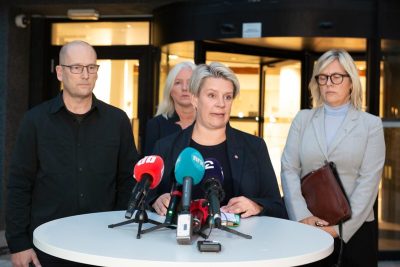Norway’s labour minister, Marte Mjøs Persen, is from the Labour Party herself and usually honours workers’ right to strike. On Tuesday evening, though, she ordered teachers nationwide to end a strike that’s dragged on since June.

“The two sides unfortunately hadn’t found a solution to their conflict,” Persen announced after summoning all three teachers’ unions and KS, the organization representing teachers’ employers (local governments), to a meeting. The strike had been deadlocked, and set to expand again next week.
“The strike is now having serious consequences for children and youth,” Persen continued. “I’m especially worried about children’s opportunities to learn, those who have other challenges and their mental health. After an overall evaluation I have therefore proposed mandatory arbitration.”
More than 8,500 teachers had been called out on strike by this week, with more plans for the strike to spread again. Around 70,000 children and youth attending public schools around the country have been affected, including around 50,000 at the elementary- and junior-high school level and 20,000 at high schools.
Persen also claimed the government had received many reports of concern about serious consequences for some children caught up in the strike, adding that they became “more serious with every day the strike lasted.” She claimed she didn’t want to have to get involved in the strike, “but when the conflict has such serious consequences, I had no choice but to step in.”
Leaders of the three unions leading the strike were bitterly disappointed. “This is a dark day,” said Steffen Handal, leader of the largest teachers’ union federation Utdanningsforbundet. He’s been at the forefront, arguing for higher pay on behalf of teachers, especially those with high levels of education, and better recognition of teachers’ contribution to society. He has repeatedly claimed that it’s difficult to recruit people into the teaching profession and that there’s a severe shortage of teachers nationwide.
“You don’t solve such problems with mandatory arbitration,” Handal said. “You’ll just be left with teachers lagging behind everyone else, and not motivated.”
Mette Johnsen Walker of another teachers’ union, Skolenes landsforbund, apologized to her members that their lengthy strike had failed while also claiming that the government’s decision to force them back to work “challenges the right teachers have to strike.” Helle Christin Nyhus, leader of the third union, Norsk Lektorlag, described herself as “angry and disappointed. It’s in fact not possible to be anything other than that, on behalf of all the members and schools we were fighting for.”
They all viewed the leader of the municipal employers’ organization KS, Tor Arne Gangstø, as their opponent who prevailed by steadfastly refusing to meet their demands. “But we are very glad that 150,000 children and youth can now come back to school,” Gangstø said.
Education Minister Tonje Brenna of the Labour Party faced criticism for not taking a more active role in the conflict, or trying to solve it. She also said, though, that the strike had “great consequences for the lives of children and youth when their offer of an education disappeared.” Now she hopes both teachers and children “will use the rest of the school year well.” She also suggested that municipalities that have saved millions of kroner by not paying teachers during the strike can now use that money to make sure children can make up for lost time in the classroom.
NewsinEnglish.no/Nina Berglund

